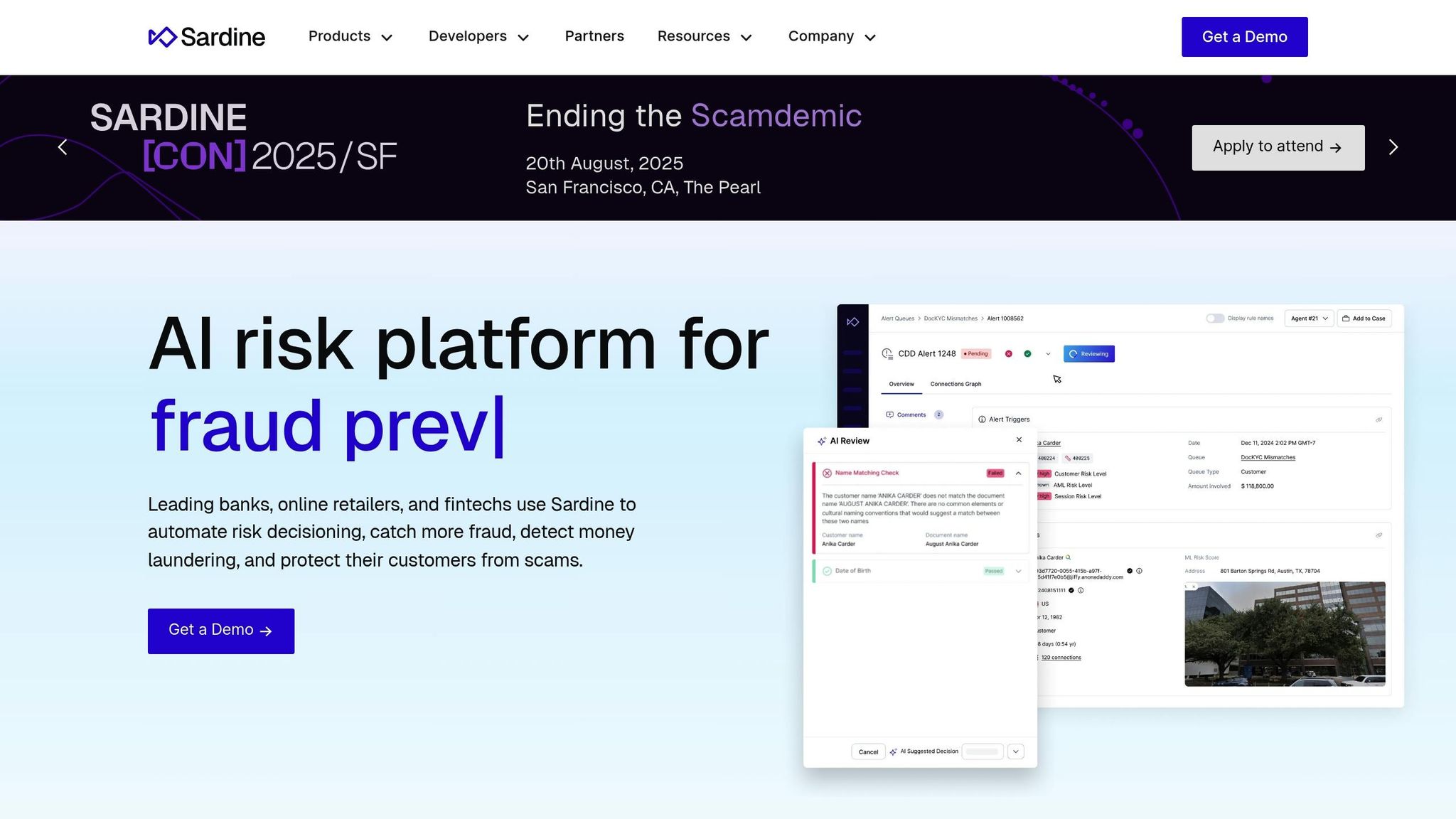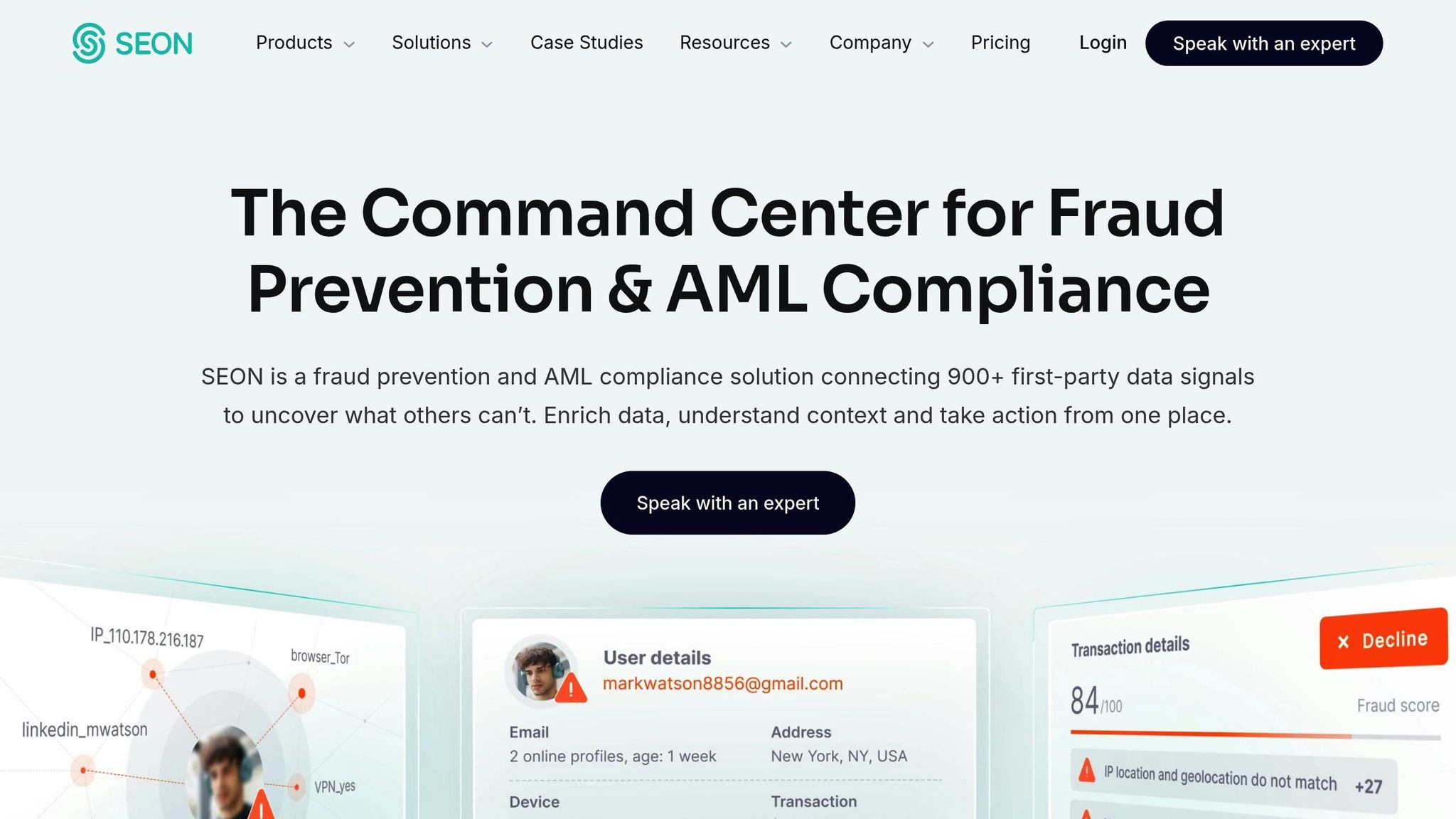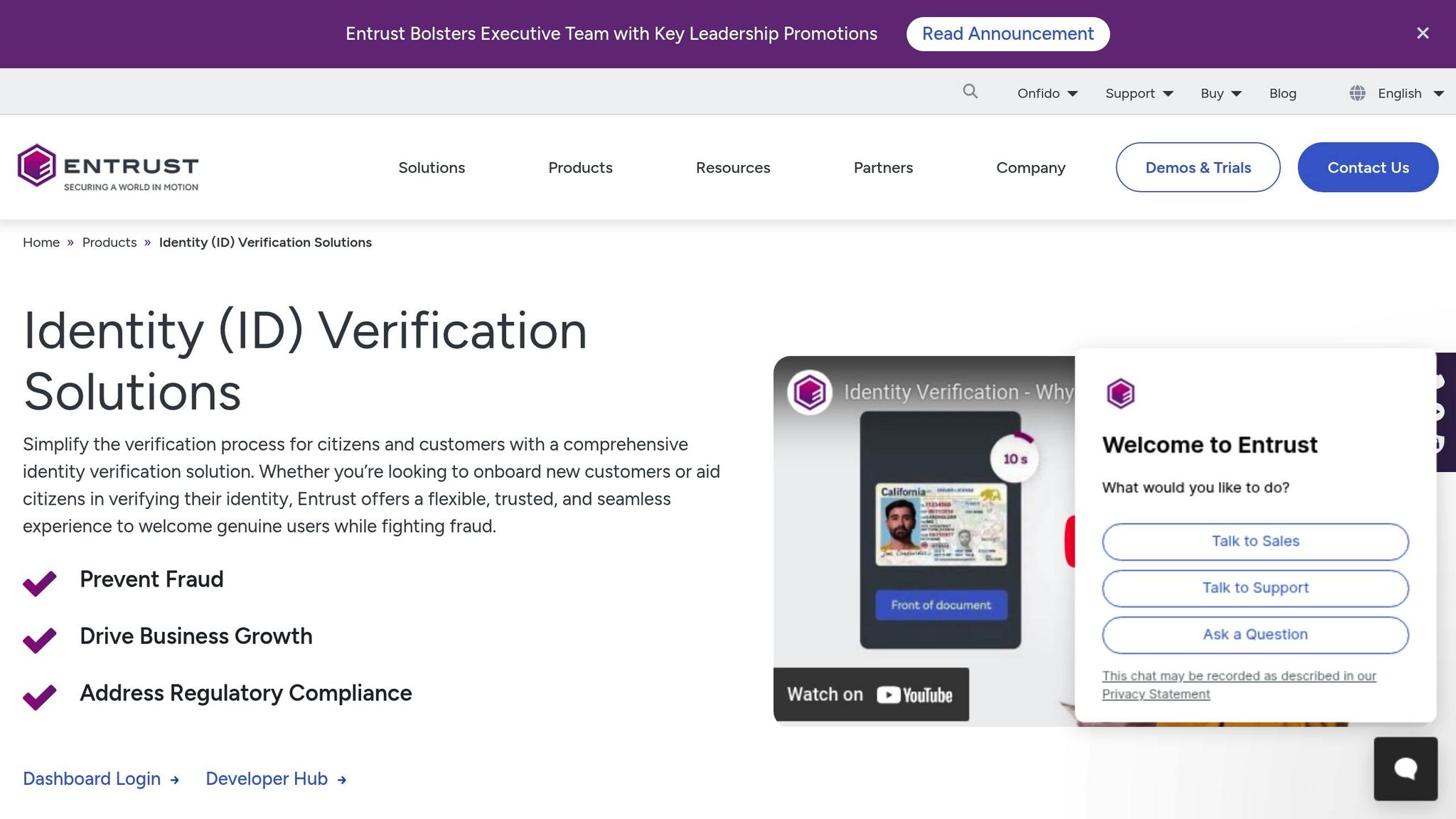
Top 5 AI Tools for Credit Card Fraud Detection
Compare features, pricing, and accuracy rates to find the right AI fraud detection system for your business size and budget.

Written by
Adam Stewart
Key Points
- Pick tools with behavioral analysis - they cut false positives by up to 70%
- Match pricing to your volume: pay per transaction or go with a flat subscription
- Get real-time monitoring that adapts to new fraud patterns as they emerge
- Find solutions that stop fraud without creating friction for legitimate customers
Credit card fraud is a growing challenge in the U.S., with scammers using advanced tactics like synthetic identities and AI-driven schemes. Traditional fraud detection systems often fall short, leading to missed fraudulent activities or false positives that frustrate customers. Modern AI tools now offer solutions by analyzing vast data in real time, detecting unusual patterns, and improving fraud detection accuracy.
Here’s a quick look at five leading AI tools to combat credit card fraud:
- Feedzai: Ideal for large financial institutions. Offers real-time transaction monitoring, behavioral analysis, and fraud case management. Pricing is enterprise-based.
- Sardine: Designed for fintechs and digital payment platforms. Features device verification, behavioral analysis, and pay-per-transaction pricing.
- Tookitaki: Focuses on behavioral pattern recognition and adaptive learning for fraud detection. Subscription-based pricing with KYC integration.
- SEON: Uses device fingerprinting and behavioral analysis for lightweight, scalable fraud prevention. Operates on a pay-per-check model.
- Onfido: Specializes in document and biometric verification for global identity checks. Pay-per-check pricing tailored to verification needs.
These tools cater to different business types, from large banks to fintech startups, and offer various pricing models based on transaction volume or verification needs. Choosing the right tool depends on your business's size, fraud risks, and compliance requirements.
Quick Comparison
| Tool | Key Features | Target Users | Pricing Model |
|---|---|---|---|
| Feedzai | Real-time monitoring, risk scoring | Large financial institutions | Enterprise-based |
| Sardine | Device verification, APIs | Fintechs, payment platforms | Pay-per-transaction |
| Tookitaki | Behavioral analysis, KYC integration | Banks, compliance-heavy users | Subscription-based |
| SEON | Device fingerprinting, investigation | Online merchants, startups | Pay-per-check |
| Onfido | Document/biometric verification | Global businesses | Pay-per-check |
Each tool offers distinct strengths, so it’s critical to align features with your business priorities to minimize fraud and optimize customer experiences.
1. Feedzai

Feedzai is an AI-driven platform designed to help financial institutions and large merchants combat fraud effectively.
The platform excels in real-time transaction monitoring by analyzing various risk factors, such as payment velocity, device fingerprinting, geolocation, and merchant categories. This allows it to flag potentially fraudulent activity while ensuring legitimate transactions go through smoothly. By using behavioral analysis, Feedzai creates detailed customer profiles and assigns risk scores when spending patterns seem unusual. If something looks off, it can trigger additional authentication steps. This kind of instant analysis is crucial in preventing credit card fraud, especially in high-stakes financial settings.
Feedzai also goes beyond traditional identity verification methods. It uses tools that verify customer identities through document checks, biometric data, and fraud databases, making it harder for synthetic identities to slip through the cracks.
On top of that, the platform includes fraud case management features. Investigators can access dashboards that summarize transaction histories, highlight risk factors, and suggest next steps. These tools not only make case reviews faster but also help with compliance and auditing.
What makes Feedzai stand out is its machine learning capabilities. The system constantly learns from new fraud patterns, successful detections, and even false positives, improving its accuracy over time.
Pricing follows an enterprise model, tailored to transaction volumes and the specific features a business needs. Costs scale based on the complexity and size of the implementation.
Feedzai is trusted by leading financial institutions worldwide for its ability to adapt and stay ahead in the fight against fraud.
2. Sardine

Sardine is an AI-driven fraud detection tool designed specifically for fintech companies and digital payment platforms. By combining real-time analytics and machine learning, it evaluates transactions to identify and flag potentially fraudulent activity. Sardine employs techniques like device verification, behavioral analysis, and identity validation to safeguard against credit card fraud. It seamlessly integrates with existing payment systems through APIs and operates on a pay-per-transaction pricing model, making it easy to scale as needed. Sardine’s flexible setup ensures it stays effective in the ever-evolving world of fraud prevention.
3. Tookitaki

Tookitaki uses machine learning to spot suspicious credit card transactions as they happen, relying on behavioral pattern recognition and adaptive learning to tackle new fraud tactics. This real-time approach ensures swift and accurate processing.
The platform analyzes thousands of data points in milliseconds, such as transaction amounts, merchant categories, user locations, and device fingerprints. This allows it to instantly approve, decline, or flag transactions for review.
What makes Tookitaki stand out is its behavioral pattern recognition technology. By studying historical transaction data, spending habits, and geographic preferences, it builds detailed profiles of typical customer behavior. Transactions that stray far from these patterns are flagged for further inspection.
Tookitaki also combines KYC (Know Your Customer) processes with real-time transaction monitoring. This dual-layered approach strengthens identity verification and compliance while reducing false positives.
For investigations, its case management system automatically creates detailed case files. These include transaction histories, risk scores, and recommended actions, making the review process smoother and more efficient.
The pricing model is subscription-based and adjusts according to transaction volume. Implementation typically takes 4–6 weeks and includes dedicated support throughout the process.
4. SEON

SEON uses a mix of device fingerprinting and behavioral analysis to assess transaction risks. By examining technical details like device data and user behavior, it identifies patterns that might signal fraud. Transactions that stray from typical behaviors are flagged for further review.
To verify identities, SEON cross-checks information from multiple data sources, making it easier to separate genuine transactions from suspicious ones.
The platform also features an investigation dashboard that pulls all relevant data into one place, simplifying the review process. SEON operates on a pay-per-check pricing model, with additional costs for advanced functionalities.
sbb-itb-ef0082b
5. Onfido

Onfido brings AI into the mix for document and biometric verification, aiming to combat credit card fraud effectively.
The platform conducts real-time identity checks by analyzing documents like driver's licenses, passports, and national IDs. Its AI scrutinizes security features and layouts to spot signs of forgery or tampering. With support for documents from many countries, Onfido offers a global reach. To enhance security, the platform uses biometric authentication, comparing a live selfie or video with the photo on the submitted document. This makes it much harder for fraudsters to succeed, as replicating someone's unique facial features is no easy task.
Onfido also helps financial institutions stay compliant with KYC (Know Your Customer) and AML (Anti-Money Laundering) regulations. By automating much of the process, it reduces the need for time-consuming manual reviews.
Pricing is based on a pay-per-check model, with costs depending on the type of verification and transaction volume. Larger enterprises can negotiate custom pricing for higher volumes and additional perks like detailed reporting and dedicated support.
Feature and Pricing Comparison
When choosing an AI fraud detection tool, it's important to weigh both pricing structures and key features to find the best match for your business. Since each platform caters to different needs, understanding these differences can help you make a more informed decision. Here's a breakdown of pricing models, target users, and essential features to consider.
Pricing Models
AI fraud detection tools typically use one of three pricing structures: fixed subscription plans, per-transaction fees, or flexible pricing that adjusts based on your business's size, industry, or sales volume. Most providers offer custom quotes tailored to your specific needs, which can make direct comparisons tricky.
Target Business Types
Different tools are designed for different users. Large institutions often lean toward all-encompassing enterprise solutions, while merchants and fintech companies tend to prefer fraud tools that are scalable and optimized for online transactions.
Key Features to Consider
Beyond pricing and target users, it’s important to evaluate how each platform handles real-time processing. Some tools are built for instant decision-making at the point of sale, while others focus on analyzing transactions after they’ve been completed. Integration complexity is another factor - some solutions require significant technical setup, while others are designed to work out of the box with minimal effort. Be sure to assess your team’s technical capacity before committing to a solution.
Making the Right Choice
Keep in mind that a higher price tag doesn’t always translate to better performance. Start by clearly defining your business needs, and take advantage of trial periods to test how well a tool integrates with your operations and whether it meets your expectations. Also, think about your long-term growth - switching fraud detection systems down the road can be both costly and time-consuming.
Conclusion
Selecting the right AI fraud detection tool hinges on understanding your business's unique needs, risk exposure, and operational priorities. Here's a closer look at some standout options:
- Feedzai is ideal for large financial institutions that require enterprise-level, omnichannel protection. Its robust case management tools and scalable pricing - based on transaction volume - make it a top choice for industry leaders like Citi, Visa, and PayPal.
- Sardine combines advanced device intelligence and behavioral biometrics, making it a strong option for fintechs. It excels at detecting over 70 types of sophisticated bots and offers modular AML compliance capabilities.
- Tookitaki uses adaptive learning and collective intelligence through its AFC Ecosystem to tackle evolving fraud patterns. This makes it particularly useful for banks with complex AML requirements.
- SEON specializes in lightweight, rapid deployment with real-time analytics and data enrichment, while Onfido offers exceptional global identity verification, leveraging document checks and biometrics across more than 195 countries.
When narrowing down your options, focus on the fraud risks most relevant to your business. For example, fintechs facing automated breaches might benefit from Sardine’s device intelligence, while platforms like Onfido are better suited for tackling identity fraud during customer onboarding. Banks managing intricate AML obligations may find Tookitaki’s adaptive intelligence or Sardine’s AML modules to be indispensable.
It's also critical to ensure your chosen platform meets essential compliance needs, such as KYC, AML, and audit trail requirements. Tools like Feedzai and Sardine provide the case management workflows needed for tasks like SAR filings and regulatory reviews.
Start with shadow-mode scoring to evaluate performance without disrupting operations. Gradually implement hard blocks once benchmarks are met. Establish clear KPIs - such as fraud loss rates, false positive rates, approval rate changes, and reductions in manual reviews - to measure the tool’s effectiveness. Be prepared for potential increases in customer inquiries during the rollout phase by leveraging 24/7 AI phone answering services like Dialzara to manage call volumes and dispute intake.
As fraud tactics continue to evolve, your chosen AI solution must adapt to new threats while supporting your business’s growth. A 60–90 day pilot, complete with measurable outcomes, will help you determine which platform delivers the best results for your specific needs.
FAQs
How do AI tools detect credit card fraud while reducing false alarms and ensuring smooth transactions?
AI tools for detecting credit card fraud leverage machine learning algorithms to pinpoint fraudulent transactions with impressive accuracy, all while keeping false positives to a minimum. By examining transaction patterns as they happen, these systems can more effectively distinguish between genuine and suspicious activity.
To keep things running smoothly, these AI models constantly evolve through real-time learning and expert-driven rule updates. This ongoing refinement helps improve detection accuracy, ensuring that legitimate transactions go through without a hitch, minimizing inconvenience for both customers and businesses.
What should businesses consider when selecting an AI tool for credit card fraud detection?
When selecting an AI tool for credit card fraud detection, it's important to weigh a few critical factors to ensure it meets your business needs. Start by examining the pricing model. Whether the tool operates on a subscription basis, pay-per-use, or tiered plan, make sure it aligns with your budget and the scale of your transactions.
Next, take a close look at the tool's features. Prioritize options like real-time monitoring, customizable rules, multi-channel fraud detection, and advanced AI capabilities for spotting complex fraud schemes. These functionalities can play a big role in enhancing both fraud prevention and detection accuracy.
Lastly, evaluate the tool's scalability and its ability to integrate with your current systems. A scalable solution will adapt as your business grows, while smooth integration helps avoid unnecessary disruptions. Striking the right balance between cost, functionality, and long-term adaptability is key to making the best choice.
How do AI-powered tools like Feedzai and Sardine detect new fraud tactics and ensure compliance with regulations such as KYC and AML?
AI-driven fraud detection tools, like Feedzai and Sardine, are designed to tackle evolving fraud tactics by analyzing massive amounts of transaction data. These tools excel at spotting unusual patterns or anomalies in real time, thanks to their advanced machine learning algorithms. As they process new data, they continuously learn and improve, keeping pace with the ever-changing landscape of fraud.
In addition to fraud detection, these tools play a crucial role in meeting regulatory requirements such as Know Your Customer (KYC) and Anti-Money Laundering (AML). By automating essential tasks like customer verification, transaction monitoring, and record-keeping, they help financial institutions stay compliant with regulations. This not only reduces manual workload but also lowers the risks tied to non-compliance.
Summarize with AI
Related Posts
Best Voice AI for Fraud Detection Workflows: 2025 E-Commerce Security Guide
Explore how AI voice tools enhance fraud detection in e-commerce, combating threats like audio deepfakes and ensuring secure transactions.
How AI Detects Fraudulent Documents in Real Time
AI revolutionizes document verification, offering real-time fraud detection, improved accuracy, and scalable security for small businesses.
AI in KYC & Onboarding: 10-Point Guide
Explore how AI is transforming KYC and customer onboarding processes with automated data extraction, document verification, risk assessment, and more in this 10-point guide.
How AI Detects Fraud in Business Phone Systems
AI is revolutionizing fraud detection in business phone systems, providing real-time monitoring and advanced security against evolving threats.
